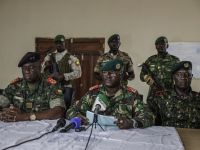Iraq said on Friday the United States would not be able to oust President Saddam Hussein the same way it topple Afghanistan's Taliban.
For its part, the United States ignored calls for a new U.N. Security Council resolution to approve any American military action against Iraq while key ally British Prime Minister Tony Blair faced opposition from his own party to a U.S.-led attack.
"The United States' position is that the Iraqi regime needs to abide by its obligations -- there is no room for negotiations or discussion -- they need to do so and do so now," White House spokesman Scott McClellan told reporters.
McClellan repeated U.S. insistence that Iraq carry out commitments made after the 1991 Gulf War to disarm.
Iraqi Vice President Taha Yassin Ramadan said Washington knew it could not overthrow Saddam the same way it ousted the Taliban. "We don't want to compare the two; Iraq is not Afghanistan," Ramadan told reporters in Beirut. "I believe that the U.S. administration is convinced of that."
Ramadan’s comments came after talks with Lebanon's President Emile Lahoud at Baabda Palace. The visit is part of a tour by Iraqi officials of several Arab and Muslim countries in an attempt to muster support against a probable US offensive.
Iraqi opposition sources said they were planning to convene next month to elect a government backed by the United States. But Ramadan said: "This talk about the Iraqi opposition is insignificant, something that doesn't merit a reply. It doesn't exist, and has no roots on the ground in Iraq."
Two new polls on Friday indicated Americans less enthusiastic of a potential war with Iraq. A poll for Time Magazine and CNN found that support for a U.S. ground invasion of Iraq at 51 percent while 40 percent of those surveyed opposed such an action. Last December a similar poll found 70 percent in favor and 22 percent against.
A Newsweek poll showed 62 percent would support military force against Iraq but fewer than half, 49 percent, would support sending large numbers of ground troops into Iraq.
The issue of Iraq was set to overshadow Friday's start of two days of informal talks by EU foreign ministers in Denmark with many EU governments having already echoed the same reservations about any US action as Arab and Asian leaders.
French President Jacques Chirac added his voice to the growing chorus late Thursday. Although he did not rule out the possibility of using force against Saddam he said it should be a joint decision by the United Nations.
"If Baghdad insists on refusing to allow the unconditional return of inspectors, it would be up to the Security Council alone to decide what measures to take," he told French ambassadors. (Albawaba.com)
© 2002 Al Bawaba (www.albawaba.com)







